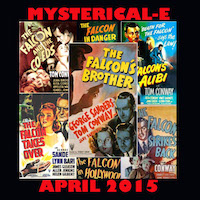This is the sixteenth anniversary of Mysterical-E’s existence. Well, sort of, anyhow. Our Editor, Joseph De Marco, stepped in and rescued the web-zine from impending doom when the previous editor, Denise Baton, decided to step down, just over ten years ago at the end of 2004.
My first column for Ms. Baton showed up in November of 2001, which was probably not the first issue. If it was, then this year is the fourteenth anniversary, which raises a question. (Note that I do not say it “begs” a question. “Begging the question” is a logic term naming a fairly widespread logical fallacy. We really should go more deeply into how people unacquainted with a term—such as TV’s notorious talking heads—assume for no reason that their intuition is a reliable guide to what an expression they’ve bumped into actually means. But not now. This parenthetical note has stalled getting to the point already, and there’s no reason to digress further in that direction.)
So, back to the question about the ten and the (possible) fourteen. The question is, why do we attach so much importance to multiples of ten—or of five or what have you?
Well, the tens part is easy enough: we use a system of representing numbers that is based on and makes heavy use of the number ten. Nobody is entirely certain why, but how about “almost certain”? Everybody has ten fingers, right? (We’re talking virtually everybody here, and the rule would then come from “virtually everybody,” not from somebody who has extra or fewer digits.) As partial evidence, we know that the ancient Babylonians, who used sixty as base when they wrote symbols for numbers, nevertheless put the symbols for sixty together using a symbol for ten. Ancient Egyptians also used ten, but in a funny way: i.e. without the clever re-use of symbols that enable some cultures (such as, blush, wonderful ours) to use what’s called a “place system.” Whoa! We’re headed for another digression. (But before we abandon it, let’s note that these early types, if they had used both fingers and toes for counting, might have ended up with a system based on twenty. Which, in fact, may have been the case in parts of Central America—among the Maya, for example.)
Okay, so much for ten. Why five? Look at your hands. Five fingers on each, right. Well, that may or may not be why, but it’s possible!
But is the number base such a powerful thing that we keep coming back to it?
Well, yes, but there are other forces at work here. A friend of mine, Chinese influenced, but not subject to most superstitions that could derive from that influence, likes the number eight. If his car bears a license plate with an eight in it, he’s really pleased. Currently he has four eights in a row, and wishes for more. I do not know why. Why are we American-influenced (but not subject to most of the superstitions that could derive from that influence) so pleased when our license plate numbers are full of zeros, especially when it ends in three or more zeros? Ah, ya got me this time, because it’s easy: it makes the plate number easier to remember.
Eight is simply a lucky number, if you move in the right circles. Around here, it’s more likely to be seven that plays that role. Meantime, one of my friends regards eight as unlucky. His opinion is somehow Bible-based, but I forget why. I don’t know anybody who regards seven as unlucky, but I’ve met people who had their own “lucky” numbers—differing from seven. Three is pretty widespread. Many Chinese regard four as unlucky, because, except for tone (remember that it’s a tonal language) the word for four is the same as the word for death. I’ve heard that Japanese has the same problem.
Meantime, regardless of the reason, we do give special attention to ten, to one hundred, to one thousand, to one hundred fifty, and so on. It’s an old habit. This year is the sesquicentennial (see: we even have a special word for it) anniversary of the end of the U.S. Civil War. And this is the tenth anniversary of Joe De Marco’s successful rescue of Mysterical-E.
I say, “Congratulations, Joe.” And I’m looking forward to the fifteenth anniversary (though a person in a hurry to celebrate can point out that eleven is a prime number, that twelve is a nice try for extremely composite, that thirteen was very useful when Walt Kelly needed humor he hadn’t thought up yet, and that fourteen is exactly the number of days in a fortnight. We don’t actually have to wait for the fifteenth year.)



